|
|
|
Sort Order |
|
|
|
Items / Page
|
|
|
|
|
|
|
| Srl | Item |
| 1 |
ID:
120478
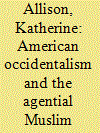

|
|
|
|
|
| Publication |
2013.
|
| Summary/Abstract |
Through the War on Terror the United States developed a seemingly enlightened understanding of Muslim women. In contrast to Orientalised representations of Muslim women's passivity and victimisation within brutal Islamic cultures these emerging representations posit Muslim women in terms of their modernity and liberation. The emergence of this new Muslim woman illuminates an attempt to secure an Occidental self through the negotiation of conflicting impulses towards Islam. Islam is recognised as the repository from which the US enemy other emerges yet the WoT also reflects a particular desire for a cosmopolitan inclusivity. The presence of the Muslim woman acts to assuage these tensions. Her oppression confirms the barbarity of the enemy yet the combination of her intrinsic agency and religiosity posits her as an acceptable Islamic other whose presence confirms the pluralistic tolerance of the US and the universal validity of its project.
|
|
|
|
|
|
|
|
|
|
|
|
|
|
|
|
| 2 |
ID:
120477
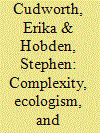

|
|
|
|
|
| Publication |
2013.
|
| Summary/Abstract |
Theorisations of the political in general, and international politics in particular, have been little concerned with the vast variety of other, non-human populations of species and 'things'. This anthropocentrism limits the possibilities for the discipline to contribute on core issues and prescribes a very limited scope for study. As a response to this narrow focus, this article calls for the development of a posthuman approach to the study of international politics. By posthuman, we mean an analysis that is based on complexity theory, rejects Newtonian social sciences, and decentres the human as the object of study. We argue for a decentring of 'the human' in our scholarship as imperative to understanding the complexity of the world. However, this approach also has a political incentive, which we describe as 'complex ecologism'.
|
|
|
|
|
|
|
|
|
|
|
|
|
|
|
|
| 3 |
ID:
120480
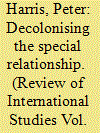

|
|
|
|
|
| Publication |
2013.
|
| Summary/Abstract |
In this article, I challenge the prevailing concept of the UK-US 'special relationship' with a view to improving the concept as an analytic tool for researchers. As it stands, the special relationship draws attention to an uncommonly close bond between two state actors in the post-Second World War period, especially in terms of military cooperation. This conception imposes analytic costs - namely, an elision of imperialism as a feature of Anglo-American relations and a concomitant marginalisation of subaltern social actors. In response, I propose a reconception that posits the subaltern - third parties - as integral to the relationship, thus better capturing the empirical reality of Anglo-American relations past and present. Theoretically, I draw upon postcolonial International Relations scholarship and recent theories of friendship in international politics. Empirically, I present a case study of the US military base on Diego Garcia in the Chagos Islands.
|
|
|
|
|
|
|
|
|
|
|
|
|
|
|
|
| 4 |
ID:
120479
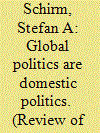

|
|
|
|
|
| Publication |
2013.
|
| Summary/Abstract |
Since 2008, the leaders of industrialised and emerging economies have engaged in steering the global economy through the G20. Divergent national positions were to be expected based upon the different stages of economic development and according to previously existing international groups. The actual controversies in the G20 did not reflect these patterns, however, but showed divergence both between industrialised countries and between emerging economies. In explaining this puzzle, I argue that the driving forces for global economic governance have ceased to be industrialised or emerging countries' alliances and levels of development. Rather, the causes for the positions of G20 members can be found in economic interests and ideas dominant in the domestic politics of countries. These societal influences shape governmental preference formation in both industrialised and emerging countries and consequently influence their behaviour in global governance. The resulting divergences weaken previously existing groups such as the G7 and the BRICs, and create a new pattern in world politics. This societal approach to explaining governmental positions in global economic governance is exemplified on the core G20 issues of stimulus/public debt and global imbalances/exchange rates.
|
|
|
|
|
|
|
|
|
|
|
|
|
|
|
|
| 5 |
ID:
120482
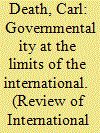

|
|
|
|
|
| Publication |
2013.
|
| Summary/Abstract |
The ability of International Relations theory to 'travel well' to other parts of the world has become one of the central questions within the discipline. This article argues that a Foucauldian-derived 'analytics of government' framework has particular advantages in overcoming some of the difficulties IR theory has faced abroad. These advantages include a methodological focus on specific practices of power at their point of application; attention to similarities between practices of power that cut across perceived binaries such as the domestic and international, and public and private; and an illumination of the ways in which practices of freedom are combined and interrelate with forms of coercion and violence. This argument is illustrated in the context of debates about the applicability of Foucauldian theory to African politics, through examples drawn from Bayart's work on globalisation, the power of development partnerships, and violence and civil war. It argues that deploying governmentality as an analytical framework, rather than seeing it as a specifically neoliberal form of power relation, can not only facilitate the application of IR theory outside Europe and North America but can also help develop a broader perspective on genuinely world politics.
|
|
|
|
|
|
|
|
|
|
|
|
|
|
|
|
| 6 |
ID:
120475
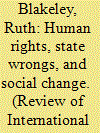

|
|
|
|
|
| Publication |
2013.
|
| Summary/Abstract |
This article demonstrates the significance of human rights for challenging state violence and terrorism. It is intended to enhance understanding of the concept of emancipation. Critical Security Studies has tended to focus on the individual as the agent of her/his own liberation. Yet many victims of oppression are not able to free themselves. Drawing on historical materialism, it is argued that collective agency on behalf of the oppressed has a necessary role to play in emancipatory politics. Emancipation is contingent on the capacity of specific agents, located socially and historically, to identify practices that might bring about change, structures that might be transformed, and appropriate agents that are in the best position to facilitate such change. This article shows how such collective social action has forced a reversal of some of the Bush administration's repressive policies, and has partially succeeded in curtailing the arbitrary use of US state power. This has been achieved through the national and international human rights architecture. Therefore, Marxian claims that human rights should be eschewed are mistaken, since they fail to acknowledge the emancipatory potential of human rights, the opportunities they provide for collective social action, and the role they can play in transformative social change.
|
|
|
|
|
|
|
|
|
|
|
|
|
|
|
|
| 7 |
ID:
120481


|
|
|
|
|
| Publication |
2013.
|
| Summary/Abstract |
This article examines the impact of the establishment of Economic and Monetary Union (EMU) and the introduction of the euro on the monetary power of its member states. Taking into consideration continuing capitalist variety among national political economies of the Eurozone, I examine the implications of EMU for the macroeconomic autonomy of different national models capitalism. Drawing on a comparative capitalism perspective, it is argued that the Eurozone's coordinated market economies - Germany in particular - have gained much more from the introduction of the euro in terms of monetary power than the other models. This argument will be based on an analysis of two key dimensions of EMU's macroeconomic governance regime: (1) exchange rate policymaking; and (2) the management of balance-of-payments.
|
|
|
|
|
|
|
|
|
|
|
|
|
|
|
|
| 8 |
ID:
120476


|
|
|
|
|
| Publication |
2013.
|
| Summary/Abstract |
Antonio Gramsci's thought has strongly influenced the fields of IR and IPE through the work of Robert Cox, Stephen Gill, Kees van der Pijl and others, engagements often gathered (not uncontroversially) under the rubric of an ostensibly unified 'neo-Gramscian' position or 'the Italian School'. The emergence of such interventions into IR/IPE has sparked controversy regarding whether Gramsci's work can be legitimately applied to 'the international', both from within IR and in other fields. This article examines the validity of such critiques of 'neo-Gramscian IPE', which we argue rely on problematic characterisations and little evidence from Gramsci's writings. More substantively, we provide an exegesis of the role of the international dimension in the construction of central categories of Gramsci's thought and his approach to nation-state formation and international organisations such as the Catholic Church and the Rotary Club, which have been regrettably neglected by all facets of these discussions. We demonstrate that Gramsci can indeed be understood as a theorist of the international, whose approach is particularly salient for the present historical conjuncture.
|
|
|
|
|
|
|
|
|
|
|
|
|
|
|
|
| 9 |
ID:
120474
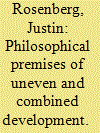

|
|
|
|
|
| Publication |
2013.
|
| Summary/Abstract |
Recent debates over Leon Trotsky's idea of 'uneven and combined development' (U&CD) have focused on its potential in the field of International Relations, but they have not established the source of this potential. Does it derive from the philosophical premises of dialectics? The present article argues that the idea of U&CD in fact involves an innovation as fundamental for Marxist dialectics as for other branches of social theory. And it also argues that in formulating this innovation, Trotsky provided a general solution to some of the most basic problems in social and international thought. The argument is set out in three parts. The first part reconstructs Trotsky's own account of dialectical premises and their implications for social explanation. The second shows how the concept of U&CD departs from this, in ways that presuppose the tacit addition of a further ontological premise. Finally, part three analyses the locus classicus of the concept - the opening chapter of Trotsky's History of the Russian Revolution - showing how it is this additional premise which underpins the central achievement of the idea: its incorporation of 'the international' into a theory of history.
|
|
|
|
|
|
|
|
|
|
|
|
|
|
|
|
| 10 |
ID:
120473
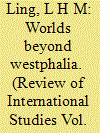

|
|
|
|
|
| Publication |
2013.
|
| Summary/Abstract |
Discourse in the US/West that a rising China threatens world order serves no national interest or international purpose. It subscribes only to Westphalian anxieties about the Other. Drawing on Daoist dialectics, this article shows how we can reframe this issue by revealing the complicities that bind even seemingly intractable opposites, thereby undermining the rationale for violence. By recognising the ontological parity between (US/Western) Self and (Chinese/non-Western) Other, we may begin to shift IR/world politics from hegemony to engagement, the 'tragedy' of great power politics to the freedom of discovery and creativity.
|
|
|
|
|
|
|
|
|
|
|
|
|
|
|
|
|
|
|
|
|